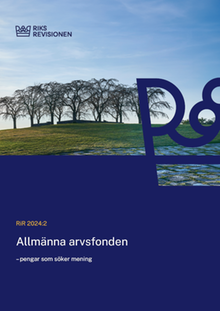The Swedish Inheritance Fund should be wound up
The Swedish Inheritance Fund receives more money than it can distribute, while at the same time the controls performed on the organisations applying for grants are inadequate. The Swedish National Audit Office (the Swedish NAO) recommends that the Fund be replaced with a more robust system for managing the legacies of deceased persons without heirs or a will.

Over the past ten years, the Swedish Inheritance Fund has had much higher income than has been possible to distribute as grants to important projects. Consequently, the responsible agencies – the Swedish Legal, Financial and Administrative Services Agency and the Swedish Inheritance Fund Commission – never need to weigh project applications against each other.
Many organisations therefore apply for – and receive – grants for projects with high staffing levels and heavy budgets; over SEK 10 million is not uncommon. The Swedish NAO considers that this has severely limited effectiveness and appropriateness in awarding grants.
“The combination of large grants and low competition poses a risk of projects being designed to obtain the grant rather than based on genuine ideas and needs,” explains Frida Widmalm, Project Leader for the audit.
The audit also shows that there is a high risk of the Fund’s money ending up in the hands of unscrupulous or criminal actors. The Swedish Security Service and the Swedish Police Authority have, on behalf of the Swedish NAO, performed searches in registers and intelligence systems. The searches show that financial crime, organised crime and crime that threatens democracy has been committed, is under investigation or is suspected at organisations in receipt of money to pursue Inheritance Fund projects.
Individuals and organisations behind the grant-funded projects are also heavily over-represented in the Financial Intelligence Unit’s register of suspected money laundering. The Swedish NAO has also seen clear indications of irregularities in staff appointments and salaries, as well as situations of conflicting interests in numerous Inheritance Fund projects.
“The fund has financed many good projects that have contributed to a higher quality of life for children and people with disabilities, for example. However, the circumstances that justified setting up the Swedish Inheritance Fund a hundred years ago are no longer relevant. The Government should develop a new system that is more robust against abuse and irregularities,” comments Auditor General Helena Lindberg.
Recommendations in brief
It is recommended that the Government commence winding up the Swedish Inheritance Fund and develop a new order for managing the legacies of deceased persons without heirs or a will.
It is believed that this will take a long time. The Government should therefore also do the following:
- Intensify efforts to ensure that agencies, when awarding grants, do not benefit financial crime, organised crime and crime that threatens democracy. Among other aspects, legislation that regulates common terms of democracy and greater opportunities for exchanging information are needed.
- Ensure that a register of representatives of non-profit associations that receive public grants is created, in which the association’s board members, signatories and auditors are registered.
- Ensure that a central database is created that covers all available government grants for civil society and the organisations that have received aid.
The Swedish NAO also makes recommendations to the Swedish Legal, Financial and Administrative Services Agency and the Swedish Inheritance Fund Commission.
See the report for the full recommendations.
The Swedish Inheritance Fund
In 1928, the Riksdag decided to remove cousins from the legal order of succession. The increasing number of legacies that would thus be without heirs were to be allocated to a special fund – the Swedish Inheritance Fund. In order for legacies to benefit future generations, the fund's money was to finance building up civil institutions for children and youths. Today, the Fund is to promote activities of a non-profit nature to the benefit of the target groups children, youths, the elderly and people with disabilities. In 2022, the Swedish Inheritance Fund's revenue was SEK 1.160 million and SEK 780 million was disbursed as grants. At the time, the fund's market value was SEK 12.3 billion.
Press contact: Olle Castelius, phone: +46 8-5171 40 04.
Presskontakt: Olle Castelius , telefon: 08-5171 42 06.
Share in social media and by e-mail
Contact form
Send your questions or comments via the form below and we will make sure that they reach the right member of staff. Please state if your question concerns the information on this particular page.


